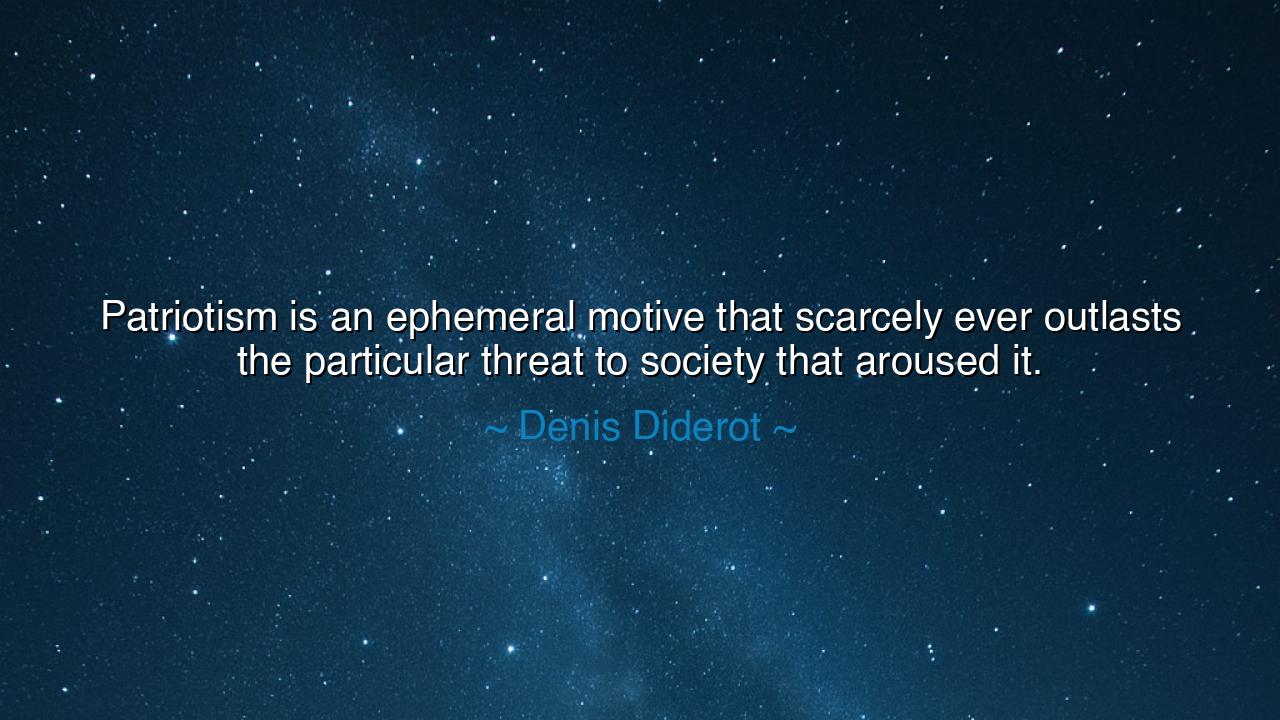
Patriotism is an ephemeral motive that scarcely ever outlasts the
Patriotism is an ephemeral motive that scarcely ever outlasts the particular threat to society that aroused it.






Hear the words of Denis Diderot, philosopher of the Enlightenment, who warned: “Patriotism is an ephemeral motive that scarcely ever outlasts the particular threat to society that aroused it.” These words strike like lightning against the illusions of permanence. For Diderot, the fever of patriotism is not the steady flame it pretends to be, but a torch lit in the hour of danger, only to flicker and die when peace returns. He reminds us that while love of country can unite a people in times of crisis, it often dissolves once the danger is past, leaving selfishness and division to creep back into the heart of society.
The origin of this insight comes from Diderot’s sharp eye upon the political movements of his time. Living in the 18th century, he saw kingdoms rise and fall, revolutions gather momentum, and masses rally under banners of national pride. Yet he also saw how swiftly these passions faded once the threat subsided. What was proclaimed as undying devotion often revealed itself as temporary fervor, tied more to fear of the enemy than to any enduring principle of justice or virtue. His words remind us that patriotism, though powerful, is fragile when not anchored to deeper values.
The ancients themselves knew this truth. Recall the Greeks at Marathon, who rose together to repel the Persian invaders. In that moment of peril, their unity was unshakable, their patriotism blazing. But in the years that followed, when the threat was gone, the city-states turned once more to rivalry, Athens against Sparta, until brother slew brother in the Peloponnesian War. The fervor of defending Hellas did not outlast the peril; once the sword of Persia was sheathed, the old divisions returned. Thus Diderot’s words echo through history: danger unites, but peace exposes the fractures beneath.
Consider also the story of the United States after September 11, 2001. In those dark days, the nation stood as one, bound together in sorrow and resolve. Flags waved, voices cried, “We are united.” Yet as years passed and the immediate threat seemed more distant, the unity waned. Partisan battles resumed, divisions deepened, and the once-bright flame of patriotism grew dim. It had been real, but fleeting—a reaction to danger more than a permanent transformation of spirit. Diderot’s words prove prophetic even centuries later.
The meaning of this quote is thus unveiled: patriotism alone cannot sustain a society. It may rally armies and stir speeches, but it is too often tied to crisis, too easily lost in comfort. If a nation is to endure, it cannot rely only on the passion of its people in moments of fear. It must cultivate justice, equality, and shared responsibility that endure beyond the battlefield. Only then can unity last when the drums of war are silent.
What lesson then shall we, the heirs of these words, take for ourselves? First, do not despise patriotism, for it has power to awaken courage. But second, do not mistake it for the foundation of a just world. Instead, build your loyalty not only on love of country in danger, but on love of humanity in peace. Ask not only what you would die for, but what you will live for when the danger is gone. For true devotion is not measured in moments of crisis, but in the quiet daily labor of building a fair and enduring society.
Therefore, children of the future, remember this teaching: patriotism is fleeting, but principle endures. Do not be content to wave the banner when the storm rages, only to fold it away when the skies clear. Instead, let your devotion to justice, compassion, and truth burn brighter than fear, so that your unity outlasts peril, and your society is not bound only by threats but by shared purpose. In this way, you will transcend the weakness Diderot saw, and build not just a nation of crisis, but a civilization of endurance.






AAdministratorAdministrator
Welcome, honored guests. Please leave a comment, we will respond soon